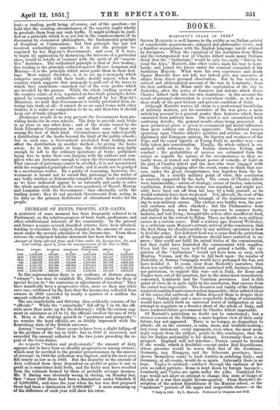INCREASE OF RENTS, PROFITS, AND GAINS.
A QUESTION of some moment has been frequently referred to in Parliament, on the relative progress of land, trade, professions, and other subdivisional interests of the community. In the present and former sessions several classified returns have been obtained, tending to elucidate the subject, founded on the amount of assess- ment under the several schedules of the Income-tax. From these returns the subjoined tabular statement has been drawn up. Amount of Duty collected from each Class under the Income-tax, for each
-
Year ending April 5, from the commencement of the Tax in 1842.
Years. Owners, Occupiers.
£ Annuitants.
1843 2,419,329 323,481 .. 812,982 ..
1844 .. 2,397,825 .. 318,216 .. 795,702 ..
1845.. 2,428,002 .. 316,161 767,895 ..
' 846 2,528,721 324,339 .. 744,019 ..
1847 .. 2,531,717 .. 322,285 .. 738,950 1848 .. 2,557,793 .. 309,890 .. 744,273 1849 .. 2,656,796 .. 320,098 .. 750,781 ..
In this representation there is no evidence of distress among " owners "; nor does it establish Mr. Disraeli's claim for them of special favour in "the remission or adjustment of taxation." They have manifestly been a progressive class, more so than any other save one ; evidenced by the fact, that the income-tax collected from owners in 1849 exceeded by nearly a quarter of a million the amount collected in 1843.
• The one comfortable and thriving class evidently consists of the "officials." While the " annuitants " fall off by 1 in 16, the offi- cials more than make up for the deficiency ; while the owners aug- ment in substance as 13 to 12, the officials swell at the rate of 10 to 8. Here is the striking growth in "greatness and prosperity": no wonder the head officials are so doubly impressed with the flourishing state of the British universe.
Among " occupiers " there seems to have been a slight falling-off in the produce of the tax in 1848; but in 1849 it recovered, and exceeded the amount collected in the two years preceding the re- peal of the Corn-duties.
As respects "traders and professionals," the amount of duty appears not to have been so steadily progressive as among owners ; which may be ascribed to the greater precariousness in the sources of revenue: in 1848 the collection was highest, and in the next year fell nearly as low as in 1843. But the disparity in the amount of duty collected from those dependent on profits or gains is not so great as is sometimes held forth, and the fixity may have resulted from the estimate formed by them of probable average incomes. Mr. T. Baring was obviously wrong instating, on Monday last, that "since 1846 there had been a d. 'tuition under Schedule D of 6,000,0001., and since the year when the tax was first proposed there had been a diminution of 8,000,0001." A mere summing-up of the difference of each year will show his error.
Traders and Professionals. OfdcialS. Total.
£
1,625,344 , 276,905 5,4.58,051 1,541,758 325,427 .. 5,378,928 1,543,233 .. 317,186 .. 5,372,477 1,678,595 .. 327,769 .. 5,603,443 1,673,476 ., 331,681 ., 5,598,109 1,685,977 340,769 5,638,702 1,529,398 .. 348,459 .. 5,605,532


























 Previous page
Previous page